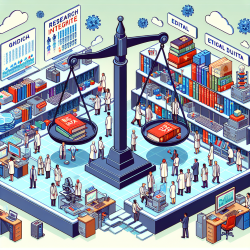Introduction
In the evolving landscape of healthcare, Shared Medical Appointments (SMAs) have emerged as a promising model for enhancing patient-centered care. The research article "Shared medical appointments and patient-centered experience: a mixed-methods systematic review" provides a comprehensive analysis of SMAs and their impact on patient experience. This blog post aims to help practitioners improve their skills by implementing the outcomes of this research or encouraging further exploration into SMAs.
Understanding Shared Medical Appointments
Shared Medical Appointments, or group visits, are a healthcare delivery method that brings together multiple patients with similar health conditions in a single session. This approach allows for extended interaction between patients and healthcare providers, fostering a sense of community and shared learning among participants.
Key Findings from the Research
The systematic review identified several consistent models of SMAs, including cooperative health care clinics, group visits, and group prenatal care. The research highlighted the following benefits of SMAs:
- Improved Patient Trust: SMAs have been shown to enhance patient trust in healthcare providers, as patients appreciate the increased time and attention they receive during group sessions.
- Enhanced Quality of Care: Patients participating in SMAs often report higher satisfaction with the quality of care they receive, as these appointments allow for comprehensive discussions and personalized attention.
- Better Health Outcomes: SMAs have demonstrated improvements in clinical parameters such as blood pressure, blood glucose levels, and overall health management, particularly for chronic conditions.
- Sense of Community: Patients benefit from the support and camaraderie of group settings, which can alleviate feelings of isolation and encourage active participation in their healthcare.
Implementing SMAs in Practice
For practitioners looking to implement SMAs, the research suggests several strategies for success:
- Interprofessional Collaboration: SMAs thrive in environments where healthcare professionals from various disciplines collaborate to provide comprehensive care.
- Patient Engagement: Encouraging patients to actively participate in their care during SMAs can lead to improved self-management and satisfaction.
- Standardized Measures: Establishing standardized measures for patient satisfaction and clinical outcomes can help refine and optimize the SMA model.
Encouraging Further Research
While the benefits of SMAs are evident, further research is needed to explore their long-term impact and potential for broader application. Practitioners are encouraged to contribute to this growing body of evidence by conducting studies on SMAs in diverse healthcare settings.
Conclusion
Shared Medical Appointments offer a unique opportunity to enhance patient-centered care and improve health outcomes. By implementing the insights from this systematic review, practitioners can refine their skills and contribute to the advancement of this innovative healthcare model.
To read the original research paper, please follow this link: Shared medical appointments and patient-centered experience: a mixed-methods systematic review.










